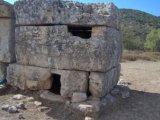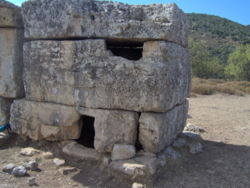
Shammai
Encyclopedia

Judaism
Judaism ) is the "religion, philosophy, and way of life" of the Jewish people...
's core work of rabbinic literature
Rabbinic literature
Rabbinic literature, in its broadest sense, can mean the entire spectrum of rabbinic writings throughout Jewish history. However, the term often refers specifically to literature from the Talmudic era, as opposed to medieval and modern rabbinic writing, and thus corresponds with the Hebrew term...
, the Mishnah
Mishnah
The Mishnah or Mishna is the first major written redaction of the Jewish oral traditions called the "Oral Torah". It is also the first major work of Rabbinic Judaism. It was redacted c...
.
Shammai was the most eminent contemporary and the halakhic
Halakha
Halakha — also transliterated Halocho , or Halacha — is the collective body of Jewish law, including biblical law and later talmudic and rabbinic law, as well as customs and traditions.Judaism classically draws no distinction in its laws between religious and ostensibly non-religious life; Jewish...
opponent of Hillel
Hillel the Elder
Hillel was a famous Jewish religious leader, one of the most important figures in Jewish history. He is associated with the development of the Mishnah and the Talmud...
, and is almost invariably mentioned along with him.
Shammai founded a school of his own, known as the House of Shammai
House of Shammai
The House of Shammai was the school of thought of Judaism founded by Shammai, a Jewish scholar of the 1st century...
, which differed fundamentally from that of Hillel; and many of Shammai's sayings are probably embodied in those handed down in the name of his school.
History
Shammai's school of thought became known as the House of ShammaiHouse of Shammai
The House of Shammai was the school of thought of Judaism founded by Shammai, a Jewish scholar of the 1st century...
, as Hillel's was known as the House of Hillel
House of Hillel
The House of Hillel , also known as the Academy of Hillel, founded by the famed Hillel the Elder, is a school of Jewish law and thought that thrived in 1st century B.C.E.Jerusalem. The House of Hillel is most widely known for its hundreds of disputes with the Beit Shammai, founded by Shammai, a...
(Beit Hillel). After Menahem the Essene had resigned the office of Av Beit Din
Av Beit Din
Av Beit Din, Av Beis Din, or Abh Beyth Diyn . was the second-highest ranking member of the Sanhedrin during the Second Commonwealth period. He presided over the Sanhedrin in the absence of the Nasi, and was the chief of the Sanhedrin when it sat as a criminal court...
(or vice-president) of the Sanhedrin
Sanhedrin
The Sanhedrin was an assembly of twenty-three judges appointed in every city in the Biblical Land of Israel.The Great Sanhedrin was the supreme court of ancient Israel made of 71 members...
, Shammai was elected to it, Hillel being at the time president
Nasi
Nāśī’ is a Hebrew title meaning prince in Biblical Hebrew, Prince in Mishnaic Hebrew, or president in Modern Hebrew.-Genesis and Ancient Israel:...
. After Hillel died, circa 20 CE, Shammai took his place as president but no vice-president from the minority was elected so that the school of Shammai attained complete ascendancy, during which Shammai passed "18 ordinances" in conformity with his ideas. The Talmud
Talmud
The Talmud is a central text of mainstream Judaism. It takes the form of a record of rabbinic discussions pertaining to Jewish law, ethics, philosophy, customs and history....
states that when he passed one of the ordinances, contrary to the opinion of Hillel, the day "was as grievous to Israel as the day when the [golden] calf
Golden calf
According to the Hebrew Bible, the golden calf was an idol made by Aaron to satisfy the Israelites during Moses' absence, when he went up to Mount Sinai...
was made" (Shabbat
Shabbat (Talmud)
Shabbat is first tractate in the Order of Moed, of the Mishnah and Talmud. The tractate consists of 24 chapters.The tractate primarily deals with laws relating to Shabbat , and the activities prohibited on Shabbat and distinguishes between Biblical prohibitions and Rabbinic prohibitions...
, 17a). The exact content of the ordinances is not known, but they seem to have been designed to strengthen Jewish identity by insisting on stringent separation between Jews and gentiles, an approach that was regarded as divisive and misanthropic by Shammai's opponents.
Legacy
Hillel's grandson GamalielGamaliel
Gamaliel the Elder , or Rabban Gamaliel I , was a leading authority in the Sanhedrin in the mid 1st century CE. He was the grandson of the great Jewish teacher Hillel the Elder, and died twenty years before the destruction of the Second Temple in Jerusalem...
succeeded to the position of president after Shammai in the year 30, but the Sanhedrin would remain dominated by the house of Shammai until around 70 (see Council of Jamnia
Council of Jamnia
The Council of Jamnia or Council of Yavne is a hypothetical late 1st-century council at which it is postulated the canon of the Hebrew Bible was finalized....
). A "voice from heaven" is said to have nullified the legality of the rulings of the house of Shammai (Yerushalmi
Yerushalmi
Yerushalmi may refer to:* Jerusalem Talmud * Meurav Yerushalmi * Targum Yerushalmi* Targum Pseudo-Jonathan * Jerusalemite- Family name :* Aharon Yerushalmi...
Berakhot
Berakhot (Talmud)
Berachot is the first tractate of Seder Zeraim, a collection of the Mishnah that primarily deals with laws relating to plants and farming...
, 1:7), which is why Rabbinical Judaism follows Hillel.
Shammai took an active part in the political and religious complications of his native land. Of an irascible temperament, he seemed to lack some of the tireless patience which is said to have distinguished Hillel. Once, when a gentile
Gentile
The term Gentile refers to non-Israelite peoples or nations in English translations of the Bible....
came to him and asked to be converted to Judaism
Conversion to Judaism
Conversion to Judaism is a formal act undertaken by a non-Jewish person who wishes to be recognised as a full member of the Jewish community. A Jewish conversion is both a religious act and an expression of association with the Jewish people...
(or Noahite monotheism as H. Falk argues) upon conditions which Shammai held to be impossible, he drove the applicant away; whereas Hillel succeeded in converting him (Shabbat, 31a).
Religious views
Shammai recommended a friendly attitude toward all. His motto was: "Make the study of the TorahTorah
Torah- A scroll containing the first five books of the BibleThe Torah , is name given by Jews to the first five books of the bible—Genesis , Exodus , Leviticus , Numbers and Deuteronomy Torah- A scroll containing the first five books of the BibleThe Torah , is name given by Jews to the first five...
your chief occupation; speak little, but accomplish much; and receive every man with a friendly countenance" (Avoth, i. 15). He was modest even toward his pupils.
In his religious views Shammai was known to be strict. He wished to make his son, while still a child, conform to the law regarding fasting on Yom Kippur
Yom Kippur
Yom Kippur , also known as Day of Atonement, is the holiest and most solemn day of the year for the Jews. Its central themes are atonement and repentance. Jews traditionally observe this holy day with a 25-hour period of fasting and intensive prayer, often spending most of the day in synagogue...
(the Day of Atonement); he was dissuaded from his purpose only through the insistence of his friends (Yoma
Yoma
Yoma is the fifth tractate of Seder Moed of the Mishnah and of the Talmud. It is concerned mainly with the laws of the Jewish holiday Yom Kippur, on which Jews atone for their sins from the previous year...
, 77b). Once, when his daughter-in-law gave birth to a boy on Sukkot
Sukkot
Sukkot is a Biblical holiday celebrated on the 15th day of the month of Tishrei . It is one of the three biblically mandated festivals Shalosh regalim on which Hebrews were commanded to make a pilgrimage to the Temple in Jerusalem.The holiday lasts seven days...
(the Feast of Tabernacles) he broke through the roof of the chamber in which she lay in order to make a sukkah
Sukkah
A sukkah is a temporary hut constructed for use during the week-long Jewish festival of Sukkot. It is topped with branches and often well decorated with autumnal, harvest or Judaic themes...
of it, so that his new-born grandchild might fulfill the religious obligation of the festival (Sukkah
Sukkah (Talmud)
Sukkah is a book of the Mishnah and Talmud. It is the sixth volume in the Order of Moed. Sukkah deals primarily with laws relating to the Jewish holiday of Sukkot...
, 28a).
In the Midrash
Midrash
The Hebrew term Midrash is a homiletic method of biblical exegesis. The term also refers to the whole compilation of homiletic teachings on the Bible....
Sifre, Deuteronomy
Deuteronomy
The Book of Deuteronomy is the fifth book of the Hebrew Bible, and of the Jewish Torah/Pentateuch...
, § 203 it is said that Shammai commented exegetically upon three passages of Scripture. These three examples of his exegesis are: (1) the interpretation of Deuteronomy, xx. 20 (Tosefefta, Eruvin, iii. 7); (2) that of II Sam. xii. 9 (Kiddushin, 43a); and (3) either the interpretation of Leviticus
Leviticus
The Book of Leviticus is the third book of the Hebrew Bible, and the third of five books of the Torah ....
, xi. 34, which is given anonymously in Sifra on the passage, but which is the basis for Shammai's halakha
Halakha
Halakha — also transliterated Halocho , or Halacha — is the collective body of Jewish law, including biblical law and later talmudic and rabbinic law, as well as customs and traditions.Judaism classically draws no distinction in its laws between religious and ostensibly non-religious life; Jewish...
transmitted in 'Orlah ii. 5, or else the interpretation of Exodus, xx. 8 ("Remember the Sabbath"), which is given in the Mekilta, Yitro, 7 (ed. Weiss, p. 76b) in the name of Eleazar ben Hananiah, but which must have originated with Shammai, with whose custom of preparing for the Sabbath it accords.
See also
- Shammaite
- MishnahMishnahThe Mishnah or Mishna is the first major written redaction of the Jewish oral traditions called the "Oral Torah". It is also the first major work of Rabbinic Judaism. It was redacted c...
- Hillel and ShammaiHillel and ShammaiHillel and Shammai were two leading rabbis of the early 1st century CE who founded opposing schools of Jewish thought, known as the House of Hillel and House of Shammai...
- Kfar ShamaiKfar ShamaiKfar Shamai is a moshav in the Upper Galilee near the city of Safed in northern Israel. It belongs to the Merom HaGalil Regional Council.The moshav was founded in 1949 by immigrants to Israel from Yemen...
IsraelIsraelThe State of Israel is a parliamentary republic located in the Middle East, along the eastern shore of the Mediterranean Sea...
i moshavMoshavMoshav is a type of Israeli town or settlement, in particular a type of cooperative agricultural community of individual farms pioneered by the Labour Zionists during the second aliyah...
named after Shammai

